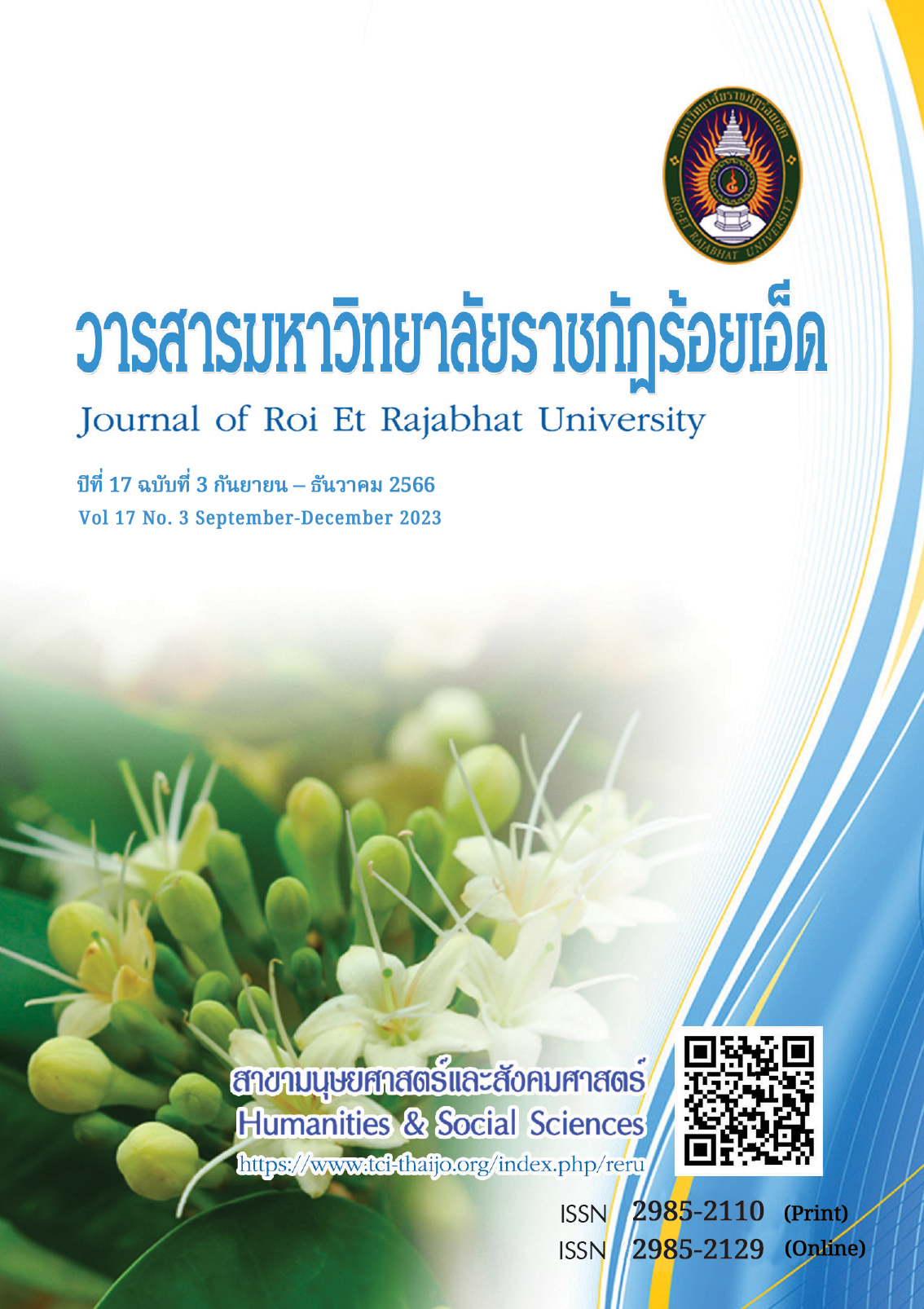Instructional Leadership in 21st Century of School Administrators Affecting of Academic Affairs Administration of Schools under Roi Et Primary Educational Service Area Office 1
Keywords:
Instructional Leadership in 21st Century, School Administrators, Academic Affairs Administration of SchoolsAbstract
The objectives of this research were to 1) examine the level of academic affairs administration
in schools; 2) investigate the instructional leadership of school administrators in the twenty-first century;
3) examine the relationship between academic affairs administration and instructional leadership in
the twenty-first century; and 4) investigate the impact of instructional leadership on academic affairs administration in schools. The research utilized a sample group consisting of 33 school administrators
and 227 government instructors, totaling 310 individuals. Stratified random sampling was employed, classifying the individuals based on the size of their respective schools. The sampling table developed by Krejcie & Morgan was used for this purpose. The research was divided into three sections. Part 1 consisted of a checklist, while parts 2 and 3 involved a rating scale questionnaire with levels ranging from 1 to 5. The confidence value for part 2 was 0.91, and for part 3 it was 0.94. The statistics used in the data analysis were Percentage, Mean, and Standard Deviation. The statistics used to test the hypothesis were Pearson's Product Moment Correlation Coefficient and Stepwise Multiple Regression. The findings indicated that:
1) school administrators demonstrated a high level of instructional leadership in the 21st century,
2) the administration of academic affairs in schools also exhibited a high level of proficiency, 3) there was a strong positive correlation between the instructional leadership of school administrators in the 21st century and the administration of academic affairs in schools. The correlation coefficient reached a statistical significance at a level of .01, 4) the instructional leadership of school administrators in the 21st century has a significant impact on the administration of academic affairs in schools. This impact is manifested through four crucial aspects: defining a vision, goal, and mission for learning, fostering student development, promoting teacher development, and creating a conducive learning atmosphere. The four factors accurately predicted 84.50% of the variance in academic affairs administration of schools, with a statistical significance level of .01.
References
กระทรวงศึกษาธิการ. (2560). เอกสารประกอบการพัฒนาหลักสูตรพัฒนาผู้นำการเปลี่ยนแปลงเพื่อรองรับการกระจายอำนาจ. กรุงเทพฯ: สำนักพิมพ์คณะรัฐมนตรีและราชกิจจานุเบกษา.
ชวนะ ทวีอุทิศ. (2559). รูปแบบการพัฒนาภาวะผู้นำทางวิชาการของผู้บริหารสถานศึกษาระดับมัธยมศึกษาสังกัดสำนักงานคณะกรรมการการศึกษาขั้นพื้นฐานในภาคตะวันออกเฉียงเหนือ. ดุษฎีนิพนธ์ ครุศาสตรดุษฎีบัณฑิต สาขาวิชา
ภาวะผู้นำทางการบริหารการศึกษา. สกลนคร: มหาวิทยาลัยราชภัฏสกลนคร.
ไชยา ภาวะบุตร. (2560). ภาวะผู้นำทางวิชาการ. สกลนคร: มหาวิทยาลัยราชภัฏสกลนคร.
ธัญญลักษณ์ ผาภูมิ. (2559). ความสัมพันธ์ระหว่างภาวะผู้นำทางวิชาการกับประสิทธิผลงานวิชาการของสถานศึกษา สังกัดสำนักงานเขตพื้นที่การศึกษาประถมศึกษาร้อยเอ็ด เขต 1. วิทยานิพนธ์ การศึกษามหาบัณฑิต สาขาวิชาการบริหารการศึกษา. มหาสารคาม: มหาวิทยาลัยมหาสารคาม.
บุญชม ศรีสะอาด. (2560). การวิจัยเบื้องต้น (พิมพ์ครั้งที่ 10). กรุงเทพฯ: สุวีริยาสาส์น.
บุญช่วย สายราม. (2561). ทักษะภาวะผู้นำสำหรับผู้บริหารสถานศึกษาในศตวรรษที่ 21. สืบค้นเมื่อ 24 พฤศจิกายน 2564, จาก http://wetoknows.blogspot.com/2018/04/21-21st-centuryleadership-skill-for.html
ผกากรอง ศรีประไหม. (2558). การศึกษาภาวะผู้นำทางวิชาการของผู้บริหารสถานศึกษา สังกัดสำนักงานเขตพื้นที่การศึกษาประถมศึกษากาฬสินธุ์ เขต 3. วิทยานิพนธ์ ครุศาสตรมหาบัณฑิต สาขาวิชาการบริหารการศึกษา. สกลนคร:
มหาวิทยาลัยราชภัฏสกลนคร.
สำนักงานเขตพื้นที่การศึกษาประถมศึกษาร้อยเอ็ด เขต 1. (2564). ผลทดสอบคะแนน O-NET, NT, RT. สืบค้นเมื่อ
พฤศจิกายน 2564, จาก https://roiet1.go.th/?page_id=137
สำนักงานเขตพื้นที่การศึกษาประถมศึกษาร้อยเอ็ด เขต 1. (2564). รายงานผลการดำเนินงานประจำปีงบประมาณ พ.ศ. 2564. ร้อยเอ็ด: สำนักงานเขตพื้นที่การศึกษาประถมศึกษาร้อยเอ็ด เขต 1.
สำนักงานคณะกรรมการการศึกษาขั้นพื้นฐาน. (2550). แนวทางการกระจายอำนาจการบริหารและการจัดการศึกษา
ให้คณะกรรมการสำนักงานเขตพื้นที่การศึกษาและสถานศึกษา ตามกฎกระทรวงกำหนดหลักเกณฑ์และวิธีการ
กระจายอำนาจการบริหารและการจัดการศึกษา พ.ศ. 2550. กรุงเทพฯ: โรงพิมพ์ชุมชนสหกรณ์การเกษตรแห่งประเทศไทย.
สำนักงานเลขาธิการสภาการศึกษา. (2557). รายงานการวิจัยแนวทางการพัฒนาการศึกษาไทยกับการเตรียมความพร้อมศตวรรษที่ 21. กรุงเทพฯ: สำนักงานเลขาธิการสภาการศึกษา.
สำนักงานเลขาธิการสภาการศึกษา. (2560). แผนการศึกษาแห่งชาติ พ.ศ.2560-2579. กรุงเทพฯ: กระทรวงศึกษาธิการ.
สุรพล บุญมีทองอยู่. (2556). ภาวะผู้นำของผู้บริหารโรงเรียนรางวัลพระราชทานระดับมัธยมศึกษาขนาดกลาง: การวิจัย
เพื่อสร้างทฤษฎีฐานราก. ดุษฎีนิพนธ์ ครุศาสตรดุษฎีบัณฑิต สาขาวิชาการบริหารหารศึกษา. สกลนคร: มหาวิทยาลัยราชภัฏสกลนคร.
อัจฉรา นิยมาภา. (2561). การพัฒนาตัวชี้วัดสมรรถนะภาวะผู้นําทางวิชาการของผู้บริหารสถานศึกษาในการจัดการเรียนรู้ของผู้เรียนในศตวรรษที่ 21 สังกัดกรุงเทพมหานคร. วารสารสังคมศาสตร์และมนุษยศาสตร์ (สทมส.), 24(1), 50-63.
Cronbach, L. J. (1990). Essentials of psychological testing (5th ed.). New York: Harper Collins Publishers.
Cunningham, W. G. and Cordeiro, P. A. (2009). Educational leadership: A Bridge to Improved practice. Boston: United States of America.
Gupton, S. L. (2010). The Instructional Leadership Toolbox A HANDBOOK forImproving Practice. California: Corwin Press.
MacNeill, C. N. Cavanagh, R. F. and Silcox, S. (2003). Pedagogic principal leadership. Management in Education, 17(4), 14-17.
Rew, W. J. (2013). Instructional Leadership Practices and Teacher Efficacy Beliefs: Cross - National
Evidence From TALIS. Doctoral Dissertation Doctor of Philosophy Educational Leadership and
Policy Studies. Florida: United States of America.
Robert, S. F. (1972). The administration and management of small colledge. California: United States of America.
Van Deventer, I. and Kruger, A. G. (2003). An educator’s guide to school management skills. Pretoria:
South Africa.
Downloads
Published
How to Cite
Issue
Section
License
Copyright (c) 2023 Roi Et Rajabhat University

This work is licensed under a Creative Commons Attribution-NonCommercial-NoDerivatives 4.0 International License.
บทความที่ได้รับการตีพิมพ์เป็นลิขสิทธิ์ของวารสารมหาวิทยาลัยราชภัฎร้อยเอ็ด
ข้อความที่ปรากฏในบทความแต่ละเรื่องในวารสารวิชาการเล่มนี้เป็นความคิดเห็นส่วนตัวของผู้เขียนแต่ละท่านไม่เกี่ยวข้องกับมหาวิทยาลัยราชภัฎร้อยเอ็ด และคณาจารย์ท่านอื่นๆในมหาวิทยาลัยฯ แต่อย่างใด ความรับผิดชอบองค์ประกอบทั้งหมดของบทความแต่ละเรื่องเป็นของผู้เขียนแต่ละท่าน หากมีความผิดพลาดใดๆ ผู้เขียนแต่ละท่านจะรับผิดชอบบทความของตนเองแต่ผู้เดียว





